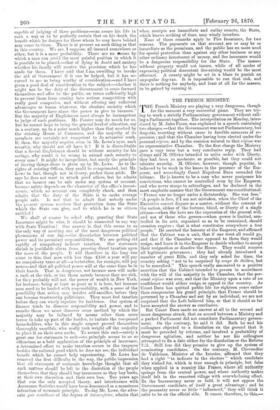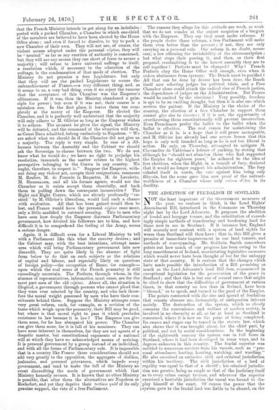THE FRENCH MINISTRY.
THE French Ministry are playing a very dangerous, though for the moment a very successful game. They are try- ing to work a strictly Parliamentary government without call- ing a Parliament together. The interpellation on Monday, intro- duced by M. Jules Fevre, was explained in a speech containing two charges,—that the Government was not Parliamentary, but despotic, resorting without cause to forcible measures of re- pression ; and that the Chamber having been elected under the personal regime, and by the coercion natural to that regime was no representative Chamber. To the first charge the Ministry gave a very terse but a very conclusive reply. They had always said M. 011ivier intended to unite order with liberty, they had been as moderate as possible, but they could not tolerate anarchy. M. 011ivier, however, though popular, is believed to be weak in the knees in the presence of the Em- peror, and accordingly Count Napoleon Darn ascended the tribune. He is known to be a man who never postpones his convictions, who cannot be controlled even by the Emperor, and who never stoops to subterfuges, and he declared in the most emphatic manner that the Government was constitutional. " France was no longer under a dictatorship. She was free." "A people is free, if I am not mistaken, when the Chief of the Executive cannot dispose as a master, without the consent of the nation, either of the fortune, blood, or liberty of a single citizen—when the laws are the expression of the general will, and not of those who govern—when power is limited, con- trolled in its acts, organized so as to be restrained, should occasion require ; that is what constitutes everywhere a free people." He asserted the honesty of the Emperor, and affirmed that the Cabinet was a unit, that if one went all would go, and that if the Chamber were opposed to them they would resign, and leave it to the Emperor to decide whether to accept their resignation or dissolve the House. They would remove all legitimate grievances ; they had already introduced a number of great Bills, and they only asked for time, the country asking " not to be surprised by coups de the'dtre, but to be consulted." This speech really amounted to a positive assertion that the Cabinet intended to govern in accordance with the will of the majority in the Chamber, that the per- sonal regime was over, and that the Ministry upon a vote of no confidence would either resign or appeal to the country. As Count Darn has quitted public life for eighteen years rather than compromise his grand principle, that France should be governed by a Chamber and not by an individual, we are not surprised that the Left believed him, or that it should so far have accepted the answer as conclusive.
But Count Daru made no answer at all to the second and more dangerous attack, that an accord between a Ministry and a packed Parliament did not constitute Parliamentary govern- ment. On the contrary, he said it did. Both he and his colleagues objected to a dissolution on the ground that it must be preceded by reforms, and involved a probability of dangerous agitation, and neither he nor his colleagues attempted to fix a date either for the dissolution or the Reform Bill. Still less did they promise to give up the system of nominating candidates. On the contrary, M. Chevandier de Valdrome, Minister of the Interior, affirmed that they had a right "to indicate to the electors " which candidate they wished for, which is true enough in principle, but false when applied to a country like France, where all authority springs from the central power, and where authority makes itself felt in the remotest village with overwhelming effect. Be the bureaucracy never so bold, it will not oppose the Government candidate, of itself a great advantage ; and be the peasantry never so little " influenced," they will think it safer to be on the official side. It comes, therefore, to this,— that the French Ministry intends to get along for an indefinite period with a packed Chamber, a Chamber in which one-third of the members are believed to have been elected by the Home Office alone ; and even if forced to dissolve, to try to pack a new Chamber of their own. They will not use, of course, the violent means adopted under the personal regime, they will be "neutral" as far as any exertion of authority is concerned, but they will use any means they can short of force to secure a majority ; will refuse to leave universal suffrage to itself, a resolution which, if necessary to the education of the suffrage, is the condemnation of that mode of election. The Ministry do not promise a free Legislature, but only that they will use the packed Legislature to secure the enfranchisement of France,—a very different thing, and, as it seems to us, a very bad thing, even if we reject the rumour that the acceptance of this Chamber was the Emperor's ultimatum. If it was, then the Ministry abandoned a prin- ciple for power ; but even if it was not, their course is a mistaken one. In the first place, it leaves them too com- pletely at the mercy of the Emperor. He elected the Chamber, and it is perfectly well understood that the majority will only adhere to M. 011ivier as long as the Emperor wishes it to adhere. The moment he gives the signal, the Ministry will be defeated, and the command of the situation will then, as Count Daru admitted, belong exclusively to Napoleon. " We are asked what we should do if the Chamber did not give us a majority. The reply is very simple. In case of a dif- ference between the Assembly and the Cabinet we should ask the Sovereign to choose between the two. We do not know what he would do ; we have no right to prejudge his resolution, inasmuch as the matter relates to the highest prerogative belonging to the Crown in any country. We ought, therefore, to respect it." Suppose the Emperor, with- out doing any violent act, accepts their resignations, summons M. Rouher, M. de Forcade la Roquette, M. de Lavalette, M. Haussmann, and all his former agents, would not the Chamber as it exists accept them cheerfully, and back them in pulling down the consequent insurrection ? The Right and Right Centre, which are already profoundly "ex- cited " by M. 011ivier's liberalism, would hail such a chance with exultation. All that has been gained would then be lost, and France would have the personal regime once more, only a little modified in outward seeming. This to men who have seen how deeply the Emperor distrusts Parliamentary government, how devoted his followers are to him, and how difficult it is to comprehend the feeling of the Army, seems a serious danger.
Again, it is difficult even for a Liberal Ministry to tell with a Parliament like this what the country desires ; and the Cabinet may, with the best intentions, attempt meas- ures which will bring Parliamentary government into new discredit. They are quite likely in the absence of light from below to do that on such subjects as the relations of capital and labour, and especially likely on questions of foreign policy—the occupation of Rome, for example— upon which the real sense of the French peasantry is still exceedingly uncertain. The Prefects, through whom, in the absence of representatives, information must come, are for the most part men of the old regime. Above all, the situation is illogical, a government through persons who cannot plead that they were ever selected by the country, and who lack there- fore the moral weight possessed by men who have their con- stituents behind them. Suppose the Ministry attempts some very great reform, such, for example, as a revision of the taxes which weigh upon the peasantry, their Bill may be good, but where is that moral right to pass it which precludes resistance to law because it is law ? The Emperor can give them none, for he has abnegated his power. The Chamber
can give them none, for it is full of his nominees. They can have none inherent in themselves, for they are not agents of a despotic master, but constitutional exponents of a national will at which they have no acknowledged means of arriving. It is personal government by a group instead of an individual, and with all the forms of Parliamentary rule. It is impossible that in a country like France these considerations should not add very greatly to the opposition, the aggregate of dislikes, jealousies, and personal grievances, which impede every government, and tend to make the fall of the Ministry an event discrediting the mode of government which that
Ministry honestly reveres. It is known that no other Ministry is possible, that after them the alternatives are Napoleon or Rochefort, and yet they deprive their tertium quid of its only genuine support, the vote of a free Parliament. I The reasons they allege for this attitude are weak, so weak that we do not wonder at the unjust suspicion of a bargain with the Emperor. They say they must make reforms. If the people desire those reforms, a free Parliament will make them even better than the present ; if not, they are only carrying on a personal rule. One reform is, no doubt, neces- sary, a law affirming the inviolability of the circumscription ; but what stops their passing it and then, as their first proposal, resubmitting it to the honest assembly they are to call together ? Prefects must be changed ? Why ? French Prefects obey the Home Office well enough, even when it orders abstinence from tyranny. The Bench must be purified ? All that can be done by decree has been done, the Bench itself now selecting judges for political trials, and a Free Chamber alone could attack the radical vice of French justice, the dependence of judges on the Administration. But France would be excited by the elections ? Very possibly, freedom is apt to be an exciting draught, but then it is also one which revives the patient. If the Ministry is the choice of the country, the election of a free Chamber to support them cannot give rise to inzeutes ; if it is not, the opportunity of overthrowing them constitutionally will prevent insurrection. Even Frenchmen prefer the ballot to the bullet when the ballot is effective. The real reason for maintaining the Chamber as it is, is a hope that it will prove manageable, and M. 011ivier has already had one severe lesson that this hope is only well founded as long as he is not too liberal in action. He only, on Thursday, attempted to mitigate M. Chevandier de Valdrome's defence of packing, by stating that although he "should not abandon those who had supported the Empire for eighteen years," he adhered to the idea of free elections, when the Right, in a tumult of fury, declared that it would no longer support his administration. The fury exhaled itself in words, the vote against him being only fifty-six, but the scene gave him new proof of the untrust- worthiness of a Chamber whose only raison d'i4re is its• docility.



































 Previous page
Previous page